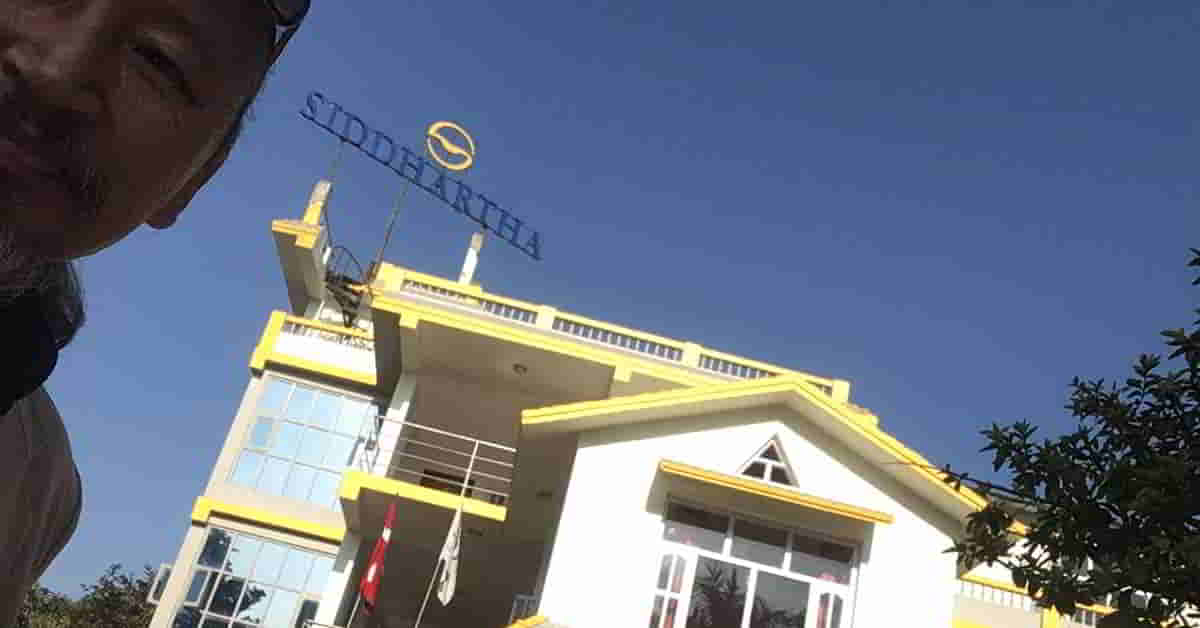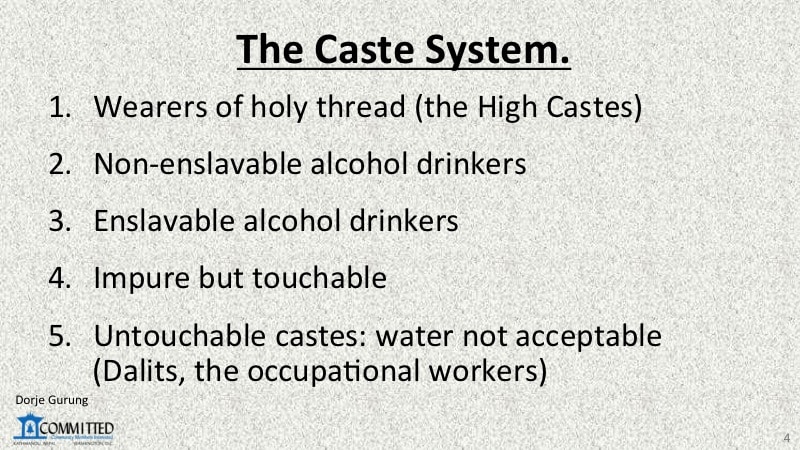
One of the many consequences of Nepalis using the caste system as the basis for who and what fellow Nepalis are, are capable of, and, even down to what they SHOULD do in life etc. is them making a lot of assumptions about fellow Nepalis.
From Sydney in Australia to Tibilisi in Georgia to Ho Chi Minh City in Vietnam to Zanzibar in Tanzania to Santorini Island in Greece to Baku in Azerbaijan to Grinnell in the United States to Lancaster in the United Kingdom to Thamel in Kathmandu, Nepal etc. — my facial features and the accent I speak English with have given rise to many an interesting and long conversations with internationals, especially at bars with drinks in hand. Some of those conversations have even led to friendships. Rarely so with Nepalis abroad however! Even more rarely so in Nepal.
The reason? My theory? Because of the assumptions Nepalis make about me based on my features and/or my name and/or surname!
Earlier this year, I had an incident at Siddhartha Hotel in Birendra Nagar (see image above) that’s kind of typical. (I was in the city to work with students and teachers at Kopila Valley School.)
I sport long hair, something I have had pretty much all my adult life. It’s usually pulled back in a ponytail. I have a round flat face, typical of ethnic Tibetans from the mountains of Nepal, including the Sherpas in the East. From time to time, I have also sported a scruffy mustache and thin beard, the kind you find on a stereotypical mongoloid face.
My English accent can sound more North-American than anything but can also come across like one of those hard-to-place or -identify international accents.
So, to most internationals, I appear and sound “exotic” and they are a conversation starter. To Nepali strangers, fellow bar customers for instance, I am (just) a Bhote (which denotes ethnic Tibetan, but is also an ethnic slur with a slew of negative connotations, including but not limited to “backward, uneducated, dirty, unintelligent, barbaric” etc.).
To many Nepalis, I could pass for any of the Tibeto-Burman hill tribe too.
To return to the incident at the hotel in Birendranagar…the morning of March 2, on the grounds of the hotel, I approached a woman I thought I recognized and initiated a conversation…only to discover that I actually hadn’t. We both happen to have frequented Martin Chautari in Kathmandu and happen to have seen one another there. Martin Chautari doesn’t attract big crowds and, the times I have gone, I have basically seen pretty much the same faces again and again.
After establishing that we didn’t know each other personally, instead of saying “I don’t know you, who are you” she opened by asking me if I were a “guide” to the huge group of Koreans we had just left behind in the restaurant.
The assumption being based ENTIRELY on my looks! Of course, as I hinted earlier, this is not the first time a Nepali assumed I were a “guide” or a “trekking guide” or a “Sherpa” (team leader of Nepali group supporting an international trekking group or a mountain climbing team). That has happened in the past a lot — on the trails in Nepal trekking by myself or with international friends, and at bars in Thamel, the tourist district in Kathmandu, where I used to hang out a LOT.
Of course, some internationals at Thamel bars have also mistaken me for a “guide” but when they discovered their mistake, they apologized profusely.
Though I shouldn’t be — because, after years of living here, I should know better — I AM surprised and taken aback by Nepalis when they initiate a conversation by letting me know that they assume I am a “trekking guide” or a “Sherpa” etc.
And that’s not the worst!
The worst is they don’t apologize for their mistake when I correct them, unlike the internationals. The woman in Birendranagar didn’t either! It’s as if like they feel entitled to make such mistakes and someone like me don’t deserve their apology.
That even in cases when it has turned out that their level of education, professional and life experiences etc. don’t come anywhere close to mine! That happened to be the case with this lady. She had no advanced degrees and had no experience working abroad. That is NOT to insinuate that she must be less intelligent than me. of course, NOT! I am in NO position to pass judgement on her intelligence.
I have also experienced the flip side of this in Nepal with fellow Nepalis.
Being ethnic Tibetan, Bhote in Nepali, again, when growing up in Nepal, we were looked down upon by others as “backward.” Likely still!
Nepalis actually use the term “backward” to label fellow Nepalis belonging to some castes, just as this twitter user did not long ago.
Yes, lots must be done in addition to #reservations (for eg, outlawing discrimination, improving quality of & access to education etc.).
BUT another reason for reservations is so that ppl don’t label others as “backward caste.” They are NOT “backward,” they’ve been MADE backward. pic.twitter.com/7xKErfXpRU— Dorje Gurung, ScD (h.c.) (@Dorje_sDooing) December 18, 2020
Many aspects of our Mongoloid appearance — facial features and attire — culture, religious practices, and language were (and likely still are) considered to be symbols of our “backwardness.”
One such symbol was our accent when speaking Nepali.
I spent most of my early childhood in our village in Mustang with my grandparents speaking Serke, my mother tongue, before being dropped off in Pokhara. I learned and was taught Nepali, my second language and NOT my mother tongue, at school. I don’t know when it was that I realized I didn’t want to speak Nepali in the typical ethnic Tibetan way my parents and older relatives did. I didn’t want to carry the stigma. And I didn’t!
Coming from a social group and family with little to no education history and one that was poor, when I got to JUST ATTEND school, it was a major deal — I hadn’t even been expected to go, just like others like me from my village. Against all odds, I completed school in Nepal, got educated in four other countries, had years of international work and extensive travel experience, and returned to Nepal.
And what do I discover? Nepalis who scoff at or take issue with my use of English and/or my North-American/International accent (i.e. non-Nepali accent) when speaking the language, one I had been using and had operated on pretty exclusively for about 25 years!
Some view my speaking English in the accent that I do as snobbery! And, of course, all that got me wondering!
Among Nepalis, is the the belief about someone belonging to the enslavable alcohol drinking Caste (number 3 below), can’t or shouldn’t be “sophisticated”? Or, is the issue really with speaking English and speaking it with one resembling that of a native speaker?
If the latter is the case, then why would pretty much ALL Nepalis choose to send their children to an English medium school if they could?! And why would pretty much ALL Nepalis send their children abroad for studies in a heart-beat — especially to a country where English is the native language — if they were granted the opportunity?! Hmmmm!!!
Or maybe the belief about a person like me is that they can’t or shouldn’t be anything other than a “Sherpa” or a “tourist guide” unlike their own kind (who can or should attend English medium school and be “educated” abroad, raise their status, become “worldly” etc., and take pride in being so etc.)?
Or maybe the belief about such a person belonging to that caste, a “backward caste,” someone like me, is that they don’t DESERVE respect for their accomplishments? (“Who are his parents or his people anyway?! Does anyone know?! Does anyone care?!”)
At least maybe NOT the respect they might accord someone of their own ethnicity or caste with similar qualifications, experience, and has such a good command of the fourth — FOURTH — language he learned growing up! (Third was Hindi!)
Or, maybe, I am NOT “backward” enough for a Bhote and that’s an affront to them?! 😀 😀
Regardless, making assumptions about and passing judgement on fellow Nepalis based on their appearance and/or their ethnicity or caste — revealed by a person’s name and/or surname — is so ingrained in Nepali psyche that, I guess, we accept it and take it all as just normal.
My sense is that Nepalis don’t even think twice about it AND don’t see anything wrong with it.
After all, caste-based stereotyping and discrimination is coded in the DNA of our society! Most of our systems and structures throughout most of its history has been DELIBERATELY based on — or influenced by — the caste system. We don’t have a dearth of Nepalis who believe in their right to discriminate, exclude, withhold rights etc. of others based entirely on their caste, for example. How then would average Nepalis not really educated — whether at home or school — about that being wrong recognize it as such?! Forget apologize to someone “beneath” them. The idea or question of making an apology would arise only when one recognizes one’s fallibility.
It is no wonder then that most of the jokes on TV series, and movies, for example, involve demeaning and making fun of others (such as Madhesis, the disabled etc.) by caricaturing them.
What do you think?
(If you are interested, click here for a short blog post about some of the stories around my facial features and appearance. Click here to read more about my Bhote Nepali accent and my North-American accent. Click here for a short blog post about how returning to Nepal after all those years of education abroad and international professional experience, for someone I likely personally know, I was still a low-caste Bhote. Click here for a blog about how Nepalis align themselves with and show allegiance to people within mostly ethnicity- and caste-based relatively small social and professional bubbles leading to them being so judgmental of fellow Nepalis. Click here for a blog post about how Nepalis are considerably more discriminatory and judgmental of fellow Nepalis than internationals and make them suffer considerably more. Click here for a blog post shredding a meme that asks Nepalis to celebrate our caste-prescribed (birth) professions etc.)

